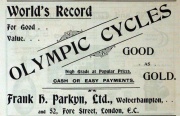of Olympic Cycle Works, Green Lane, Wolverhampton, and later at Granville Street, Wolverhampton.
Early 1880s Frank Heynes Parkyn started producing Olympic bicycles in Green Lane
1893 Advert. 'Parkyn, Olympic Cycle Works, Wolverhampton'[1]
1896 He moved to Granville Street. Introduced the latest machinery and manufacturing techniques at the works
1897. 'Frank H. Parkyn.— This company has just been registered, with a capital of £30,000. in £1. shares (of which 20,000 are 5 per cent, preference) to acquire the business carried by Frank H. Parkyn, at the Olympic Cycle Works, Granville Street, and the Model Cycle Works, Bnunswick Street. Wolverhampton, and to carry on the business of cycle manufacturers, cycle component manufacturers, tin plate-workers, stampers, piercers, carriage and motor-car builders, engineers, fitters, The subscribers are: Frank H. Parkyn. Northampton Road East, Wolverhampton, cycle manufacturer; William C. Hornblower, 36. Cleveland Head, Wolverhampton, cycle manufacturer; Mrs. Winnifred F. Parkyn. Newhampton Road East. Wolverhampton Charles R. Parkyn. 10. Seaton Avenue, Plymouth, draper; Mrs Kmily Parkvn. Strangeways Villas, Truro; Miss Edith M. Parkyn. Strangeways Villas, Truro; and Ernest Parkyn, 3. Temple Gardens. E.C., barrister. Frank H. Parkyn is the governing director - special qualification. 5,000 shares; William C. Hornblower is the ordinary director. Registered office, Granville Street, Wolverhampton'[2]
1900 Showed two examples of the New Courier motorette, a tricycle with air-cooled motor set in a duplex frame. The machine had been shown in very much the same form the previous year by Chilton and Co.
1902 National Cycle Show. Frank H. Parkyn showed a motor-bicycle fitted with the Minerva 2 h.p. engine. The frame of the machine was extra strong. Also at the show is a separate entry for Harry Parkyn who was the maker of the Olympic cycle which had used an adapted Minerva motor with strengthened frame.
1902-05 and 1919-23 Olympic were motorcycles produced by Frank H. Parkyn Ltd
1903 The first conventional motorcycles appeared, powered by 2.75hp MMC engines. Few machines were made and production soon stopped.
1919 The name returned after WWI, from a base in Granville Street, on a range of good-quality models. The first machine was powered by a Verus 268c.c., two-stroke engine. It had a two-speed gearbox, was fitted with a belt drive, and sold for £80. A selection of engines was used from Villiers, Blackburne, Verus or Orbit. The frame was designed to suit these engines and there was a patent swinging gearbox mounting, which allowed for simple adjustment of the transmission.
1920 The Olympic model for that year was powered by a 2.86hp, 261.5cc, two-stroke engine, and included an Amac carburettor, Gosport spring forks and was finished in black enamel with gold lining. The single speed version sold for £65 and the two-speed version was priced at £77. A two-speed machine with kick start was available for £84 and a three-speed version with kick start cost £90.
1923 As trade dwindled, the make disappeared.
See Also
Sources of Information
- The British Motorcycle Directory - Over 1,100 Marques from 1888 - by Roy Bacon and Ken Hallworth. Pub: The Crowood Press 2004 ISBN 1 86126 674 X
- [1] Wolverhampton Heritage and History Society


